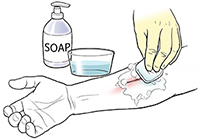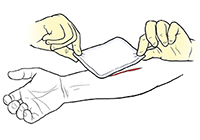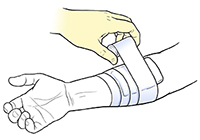First Aid: Bandaging
Covering a break in the skin helps to control bleeding and protect against infection. Dressings are pads of gauze or cloth that can be placed directly against the wound to absorb blood and other fluids. Cloth bandages cover dressings and hold them in place.
Step 1. Dress the wound
-
Put on gloves or use other protection to prevent contact with the victim's blood.
-
Clean the wound with mild soap and water.
-
Apply a small layer of topical antibiotic if desired.
-
Place a clean dressing over the entire wound. Gauze dressings let in air for faster healing. Nonstick dressings have a special surface that won't cling to the wound.
-
If blood soaks through the dressing, place another dressing over the first one.


Step 2. Cover the bandage
-
Wrap roller gauze or cloth strips over the dressing and around the wound several times.
-
Extend the bandage at least an inch beyond both sides of the dressing.
-
Don't wrap the bandage so tight that it interferes with blood flow to healthy tissue.

Step 3. Secure the bandage
Step 4. Check circulation
-
Check circulation in the area below the bandage after several minutes and again after several hours. If circulation is poor, the skin may look pale or blue or feel cold. Signs of poor circulation also include numbness and tingling.
-
If circulation is reduced, loosen the bandage right away. If symptoms continue, get medical care.
Online Medical Reviewer:
Eric Perez MD
Online Medical Reviewer:
Raymond Kent Turley BSN MSN RN
Online Medical Reviewer:
Rita Sather RN
Date Last Reviewed:
3/1/2022
© 2000-2024 The StayWell Company, LLC. All rights reserved. This information is not intended as a substitute for professional medical care. Always follow your healthcare professional's instructions.